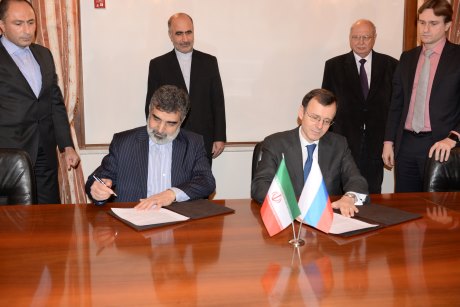Russia and Iran yesterday signed documents furthering their cooperation in the peaceful uses of nuclear energy. They were signed in Moscow by Nikolay Spassky, deputy director general for international affairs at Rosatom, the Russian state nuclear corporation, and Behrouz Kamalvandi, deputy head of the Atomic Energy Organization of Iran (AEOI) for International, Legal and Parliamentary Affairs.
 |
| Spassky (right) and Kamalvandi signing the road map on closer cooperation (Image: Rosatom) |
In addition, Petr Lavrenyuk, senior vice-president of TVEL, Rosatom's nuclear fuel subsidiary, and Seyed Safdari, general director of AEOI's Department of Advanced Technologies, signed a contract for pre-design work on the modification of two cascades of gas centrifuges at the Fordow Fuel Enrichment Plant in Iran.
The AEOI officials were on a two-day visit to Moscow to discuss progress with the Joint Comprehensive Plan of Action (JCPOA). Signed in July 2015 by Iran and the E3/EU+3 (China, France, Germany, Russia, the UK and the USA - also referred to as the P5+1 - plus the European Union), the JCPOA officially began on 16 January last year. Under its terms, Iran agreed to limit its uranium enrichment activities, eliminate its stockpile of medium-enriched uranium and limit its stockpile of low enriched uranium over the next 15 years.
Rosatom announced separately that two of its other subsidiaries - the Russian Research Institute for Nuclear Power Plant Operation (VNIIAES) and Rusatom Service - had started work on an "expert evaluation" of plans to establish a company engaged in providing Russian technical support to Iran's Bushehr nuclear power plant.
The new entity will provide methodological and technical assistance to Bushehr personnel in such areas as the handling of nuclear fuel, neutron-physics calculations, commissioning of mobile equipment, and creation of a plant maintenance strategy.
"Establishment of this specialized institute for engineering and technical support of the plant’s operation is intended to enhance the reliability, safety and efficiency of [its] operation," according to the statement. Work on the project is expected to take three years, it added.
Before the end of the summer of this year, Russian nuclear specialists will conduct a peer review of the plant and provide "organisational and methodological support to their Iranian colleagues", it said.
Russian-built Bushehr 1 was connected to the national grid on 3 September, 2011, becoming the first nuclear power plant in the Middle East.
The first foundation stone for Bushehr units 2 and 3 was laid in a ceremony held at the construction site in southern Iran in September last year. Rosatom subsidiary ASE, which is the general contractor for the Bushehr project, and Nuclear Power Production and Development Company of Iran signed an EPC turnkey contract for construction of the units at Bushehr in November 2014. The two VVER-1000 units will be built with Generation III+ technology, including the latest safety features, and have a combined capacity of 2100 MWe, ASE has said.
Researched and written
by World Nuclear News




_87299.jpg)
_52351.jpg)








